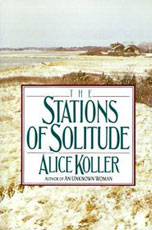In An Unknown Woman (1982) philosopher Alice Koller described a three-month journey of self-discovery in which she set out to take control of her life. In this paperback, the author continues her inquiry into "what it is to be a person: how one becomes a person, and what it is that one has become." Koller has structured this book around the stations of solitude (modeled after the Stations of the Cross that Catholics follow during Lent as a devotional exercise). She offers the following definition of solitude:
"Being solitary is being alone well: being alone luxuriously immersed in doings of your own choice, aware of the fullness of your own presence rather than of the absence of others. Because solitude is an achievement, it is your distinctive way of embodying the purposes you have chosen for your life, deciding on these rather than others after deliberately observing and reflecting on your own doings and inclinings, then committing yourself to them for precisely those reasons."
Koller reflects upon aspects of her life as the stations of solitude: among them are awakening, homing, working, loving, moneying, connecting, mourning, and recessing. The author emphasizes the benefits of being alone and the fulfillment that can come from activity that is purposeful, free, and self-determined.
